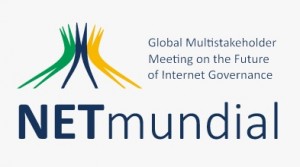Kartik Chawla, who has earlier blogged for us on Network Neutrality and the TN govt’s proposed use of Open Source software, brings us a bit of coverage of the recently concluded NETmundial, the global multistakeholder meeting on the future of internet governance. As he points out in the latter half of the post, the final outcome of the meeting was somewhat of a disappointment, given the initial potential that a participative and deliberative multistakerholder model was expected to have.
NETmundial – an overview
 NETmundial, the Global Multistakeholder Meeting on the Future of Internet Governance organised jointly by the ICANN and the Brazilian non-profit CGI.br, began in Sao Paolo on April 23, 2014, with Brazilian President Dilma Rousseff signing the Marco Civil, the world’s first Internet Bill of Rights, thereby making it law in Brazil. The two-day conference, which received a total of 187 contributions with a diversity of views, focused on two issues: the Internet Governance Principles, and the Roadmap for the future of the Internet Governance Ecosystem. The event was attended by over a thousand delegates from advocacy groups like EFF, corporate companies such as Microsoft, the governments of states from the U.S. to Russia, technical Internet groups like ICANN and the IETF, as well as videoconferencing citizens patched in from India to Argentina, including Sir Tim Berners-Lee, the man best known as the creator of the Internet.
NETmundial, the Global Multistakeholder Meeting on the Future of Internet Governance organised jointly by the ICANN and the Brazilian non-profit CGI.br, began in Sao Paolo on April 23, 2014, with Brazilian President Dilma Rousseff signing the Marco Civil, the world’s first Internet Bill of Rights, thereby making it law in Brazil. The two-day conference, which received a total of 187 contributions with a diversity of views, focused on two issues: the Internet Governance Principles, and the Roadmap for the future of the Internet Governance Ecosystem. The event was attended by over a thousand delegates from advocacy groups like EFF, corporate companies such as Microsoft, the governments of states from the U.S. to Russia, technical Internet groups like ICANN and the IETF, as well as videoconferencing citizens patched in from India to Argentina, including Sir Tim Berners-Lee, the man best known as the creator of the Internet.
The multistakeholder statements of the conference are now available online, and open to public comments. They identify certain principles and values that “may contribute for an inclusive, multistakeholder, effective, legitimate, and evolving Internet governance framework.”, including Freedom of Expression, Freedom of Association, Privacy, Accessibility, Freedom of Information and Access to Information, and Development. Along with these, they identify the following as points that such a framework must support: Culture and Linguistic Diversity, Unified and Unfragmented Space, Security and Stability of the Internet, an Open and Distributed Architecture and Enabling Environment for Innovation and Creativity.
On the basis of the above, along with the contributions to the conference as a whole, the organisers of the conference have identified what they consider the Internet Governance Process Principles. In the second part of their multistakeholder statements, the Roadmap for the Future Evolution of the Internet Governance, they have set out how they think these should be implemented.
While these principles are quite relevant in their own right, the final statements on the whole miss out on a couple of important things. For instance, Net Neutrality does not find its way into any of the principles, despite being one of the most crucial points of an innovative and equal Internet. Nor does the multistakeholder statement mention alternative architectural models to the Internet, which might perhaps serve it better. And the wording of the final multistakeholder statements of the conference have been left worryingly vague and inadequate, even on the most important of principles. For instance, the question of Mass Surveillance, which was what prompted the conference itself, has been addressed in an extremely lacking manner, simply stating procedures, practices and legislations concerning the same be reviewed, without taking a particularly strong stand on it. For such oversights and for its involvement with ICANN, which is one of the most influential bodies with regards to existing Internet Governance, NETmundial has received a fair share of criticism. The close and much-critiqued relationship between the US and ICANN does not help NETmundial’s cause, even though it is being phased out right now. Added to this, almost every country had something to criticise about the points raised at the conference, its final statement, and how further steps should be taken.
Thus, while NETmundial did achieve the multistakeholder participation and deliberation it wanted to achieve, not only have the compromises made during this event resulted in certain very crucial points been missed out in the process, it is doubtful if it will actually have the effect that it set out to have, and if the outcome of the conference will actually find effective implementation. This has prompted opinions such as that of Jean-Christophe Nicholas of the Global Journal, who states that “for more internet and more democracy, forget NetMundial and ICANN”. And even though it is too soon to predict the effects of the discourse prompted by NETmundial, these opinions seem to be worryingly close to the truth.
